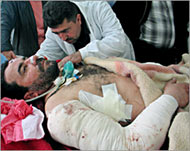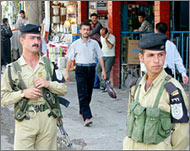Northern Iraq inches towards civil war
The Peshmerga are edgy in northern Iraq, and baying for revenge.

After this month’s devastating double-attack on the Kurdish minority’s major political parties, few feel safe from the jumpy ethnic militia.
Halting our car at a roadblock, half a dozen Peshmerga peer inside. One of them demands to know if we are carrying any Arabs.
“What about a Canadian?” one of my fellow passengers jokes back in Kurdish. His attempt at humour is cut short by the unmistakeable sound of an assault rifle being cocked.
Still, we could count ourselves fortunate at being waved through with a question and an examination of our passports.
The car in front of us had not been so lucky. It’s two male occupants had been dragged from their vehicle and thrown to the ground where they were viciously kicked at gunpoint.
In the back seat, a young woman and two small children looked on in horror.
For the past several days, similar scenes have been played out on what had previously been the relatively quiet streets of Arbil.
Simmering hatred
The singular act that transformed this northern Iraqi city into an armed camp and reignited long-simmering inter-ethnic hatred was a 1 February double human bombing.
With a death toll of 65 and an additional 200 wounded, the Arbil incident was the bloodiest attack to date in war-torn Iraq.
 |
|
Recent attacks on the two main |
The simultaneous targeting of both rival Kurdish political factions has also served to intensify already strong suspicions and deep-rooted fears of the major ethnic groups in northern Iraq.
One of my travelling companions, Mahmud Mirkhan, a 35-year-old Kurdish Iraqi expatriate living in Sweden, was returning to Arbil to attend the funeral of his older brother who had been killed in the bombing.
Although responsibility for the attack was claimed by an Islamist Kurdish group linked to al-Qaida, Mahmud was quick to dismiss this theory.
“They know the truth, but they also know that right now the anger is too strong for the people to be told,” he said. “Otherwise, the streets will run red with the blood of the Arabs.”
Separatist sentiments
His older brother had been a senior official in the Kurdistan Democratic Party (KDP) and Mahmud vowed to continue working for the ideals of the party. “My brother’s death will be avenged, and his sacrifice will be vindicated with the creation of an independent Kurdistan,” he said.
 |
|
Self-rule: Peshmerga forces on |
Echoing these separatist sentiments was Basim Rui, another Kurdish Iraqi expatriate who shared our taxi ride from the Turkish border.
At the age of 20, Basim had taken part in the 1991 post-Gulf war Kurdish uprising, but had fled to London after Saddam’s regrouped military crushed the rebellion.
“After all that the Kurds have been through, there is no way the international community can force Kurdistan back under the control of a central Iraqi government,” Basim stated.
As for future representation for other Iraqi ethnic groups living in the Kurd-controlled northern provinces, Basim said: “They are welcome to stay, so long as they accept the status of a minority.”
The question as to what those minority rights would entail has already led to a number of violent clashes between Arabs and Peshmergas since the Kurdish militia pushed south after the collapse of Saddam’s regime.
Kirkuk’s Turkmen
The Kurdish occupation of Kirkuk – the oil-rich capital of northern Iraq – has also resulted in numerous skirmishes with Turkman militia. Descendants of ancient Turks, the nearly two million Iraqi Turkmen historically constitute the majority of Kirkuk’s population.
 |
|
A Turkman injured in clashes with |
“The Peshmerga are now trying to drive us from our homes through intimidation,” said Sahid Danilchi, a spokesman for the Kirkuk-based Iraqi Turkmen Front (ITF).
On 31 January, the day before the Arbil bombing, two senior ITF officials were gunned down outside the village of Taza Khormathe, south-west of Kirkuk. Although the assassins have yet to be apprehended, the ITF has little doubt as to who is responsible for the attack.
“The Turkmen have no quarrel with the Arabs and we certainly don’t suspect the Americans of this murder,” said Sahid. “It’s the Kurds who want control of Kirkuk. But they cannot kill us all so easily.”
The growing inter-ethnic violence has not gone unnoticed by the US troops stationed in northern Iraq. “I don’t doubt that the minute we pull out of here, there is going to be a full-on civil war,” said specialist David Percy, a 23-year-old air force technician serving at the Kirkuk airbase.
“These guys all seem to hate each other, except the one thing they agree on – which is that American troops must go home. And if you’re any of our guys, you’ll find that that sentiment is unanimous”.